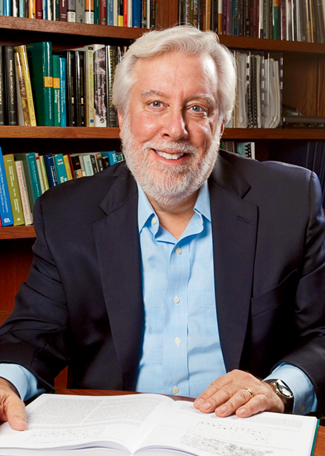
When asked about his greatest satisfaction as dean of the Graduate School of Arts & Sciences, Richard Smith’s reply is uncomplicated: “Watching students succeed,” he says.
Of course, complications abound in his work, but Smith’s single-minded commitment to this overarching goal and his passion for teaching mean rich opportunities for the school’s graduate-level scholars.
Richard Smith, PhD, the Ralph E. Morrow Distinguished University Professor, became dean in 2008 after 15 fruitful years chairing the Department of Anthropology in Arts & Sciences. During that time, anthropology became one of the university’s most popular majors. Strategic planning propelled this growth, developing exciting introductory courses that would fire students’ enthusiasm and send them out as advocates for anthropology.
Few freshmen arrive expecting to major in anthropology, Smith acknowledges. But, he adds, “Anthropology is fascinating! And if you can get them in the room, they’ll be interested.” As chair, he encouraged senior faculty to teach the department’s three introductory courses, with Smith himself teaching “Introduction to Human Evolution.” Within five years these courses were in high demand, and majors burgeoned.
“I am pushing as significantly as I can with departments to attract the very best students, mentor them in the best way possible, and give them the most resources we can, so they are trained and competitive for the best academic jobs,” Smith says.
Smith connects powerfully with students — a connection affirmed in numerous student-conferred teaching and mentoring awards. He also received the 2001 Emerson Excellence in Teaching Award and, in 2005, Washington University’s Distinguished Faculty Award. “I see teaching as a huge responsibility, and I work very hard at it,” he says.
Now he’s brought these strengths and experience to the dean’s office. His tenure didn’t begin exactly as planned, with senior management transitions and a plunging economy. “The past two years have been more about making choices about how not to cut,” he notes. Still, he adds, “I am pushing as significantly as I can with departments to attract the very best students, mentor them in the best way possible, and give them the most resources we can, so they are trained and competitive for the best academic jobs.”
Unlike professional degrees with their licensures and certifications, he points out, “what a PhD means is immensely dependent on how seriously the university takes the responsibility of awarding it.” The graduate school’s mission, he believes, is to ensure that its PhDs signal top-caliber academic achievement. He works tirelessly with student organizations, faculty, graduate program directors, department chairs and other deans to achieve that end.
Smith brings the same commitment to his campus service. Widely published and respected as an anthropologist, he admits that he has always been “most interested in the home base,” in serving the university. He has chaired or served on nine senior-level search committees, including those for medical and Sam Fox School deans, and on nearly two-dozen campus-wide panels.
And at Chancellor Mark S. Wrighton’s request, he chaired the Sesquicentennial Environmental Colloquia, which hosted 10 sessions and laid the groundwork for the university’s current focus on environmental sustainability, both in research and in campus life.
The subject is close to his heart. In his introductory course, his “Last Lecture” is famous. After having taught for a semester on human life in the past, he turns to the future and to global climate change. Upper-class students frequently return to attend it. “I think I’ve turned more students on to careers in environmental activism than in anthropology,” he says. “And I’m happy about that.”
Wrighton prizes Smith’s leadership. “Throughout his impressive career, Richard Smith has distinguished himself as a skilled administrator, dependable leader and an outstanding educator,” Wrighton says. “Rich is also a remarkable teacher, and he developed a reputation as one of the university’s finest professors. Washington University is a better place because of his many contributions.”
Betsy Rogers is a freelance writer based in Belleville, Ill.
Comments and respectful dialogue are encouraged, but content will be moderated. Please, no personal attacks, obscenity or profanity, selling of commercial products, or endorsements of political candidates or positions. We reserve the right to remove any inappropriate comments. We also cannot address individual medical concerns or provide medical advice in this forum.